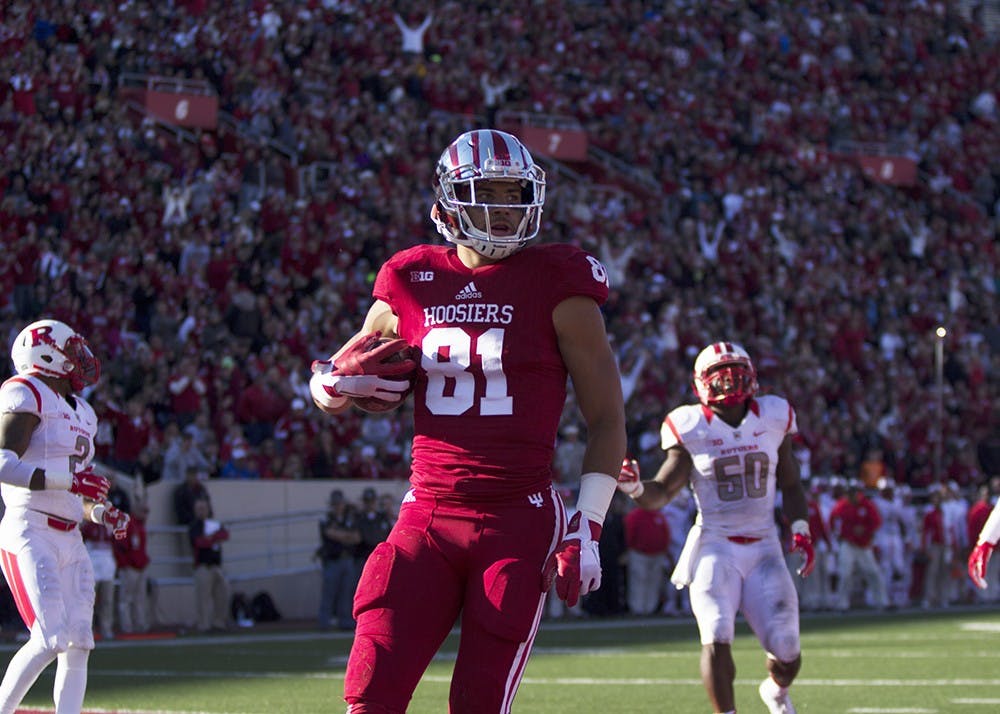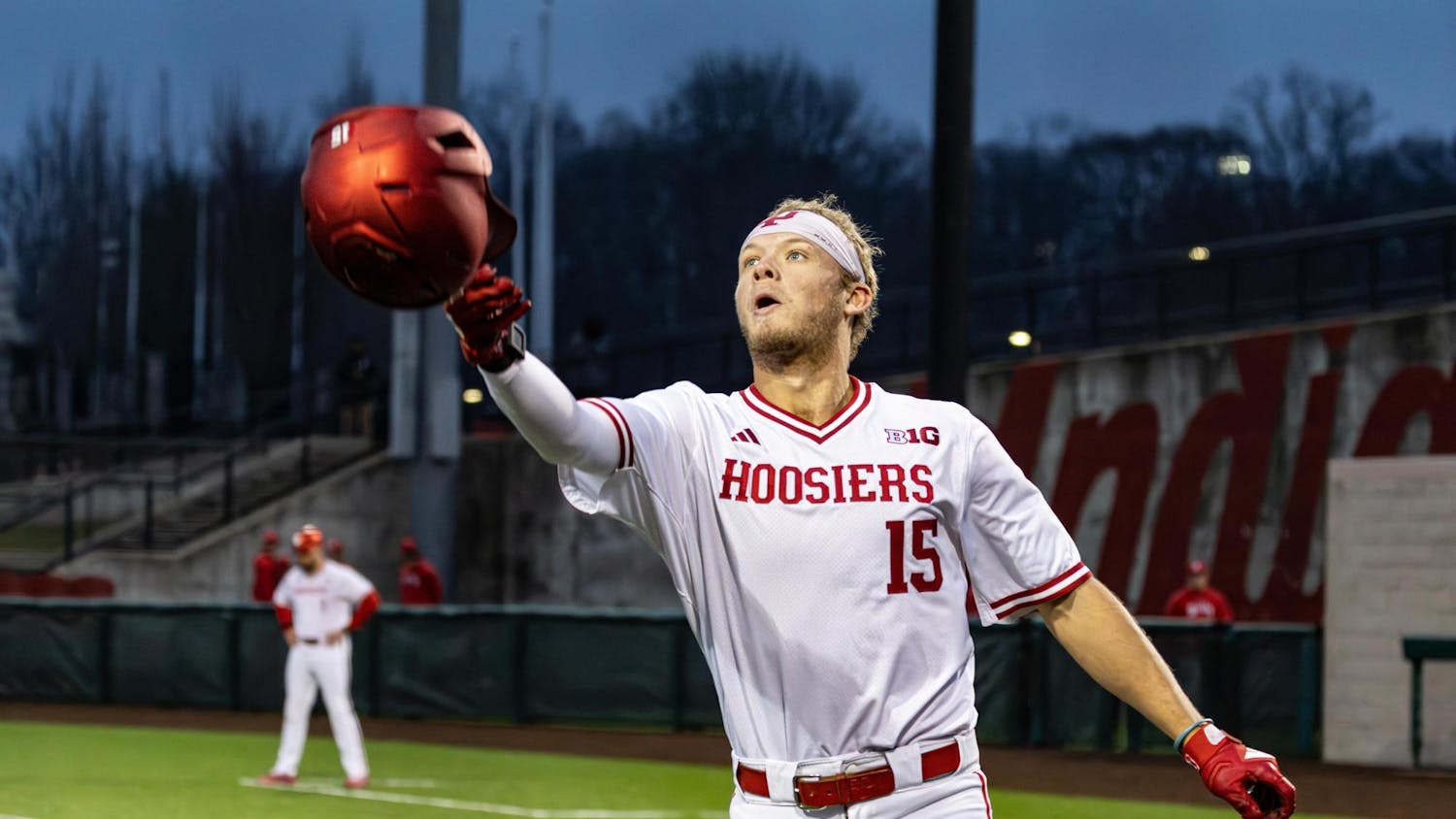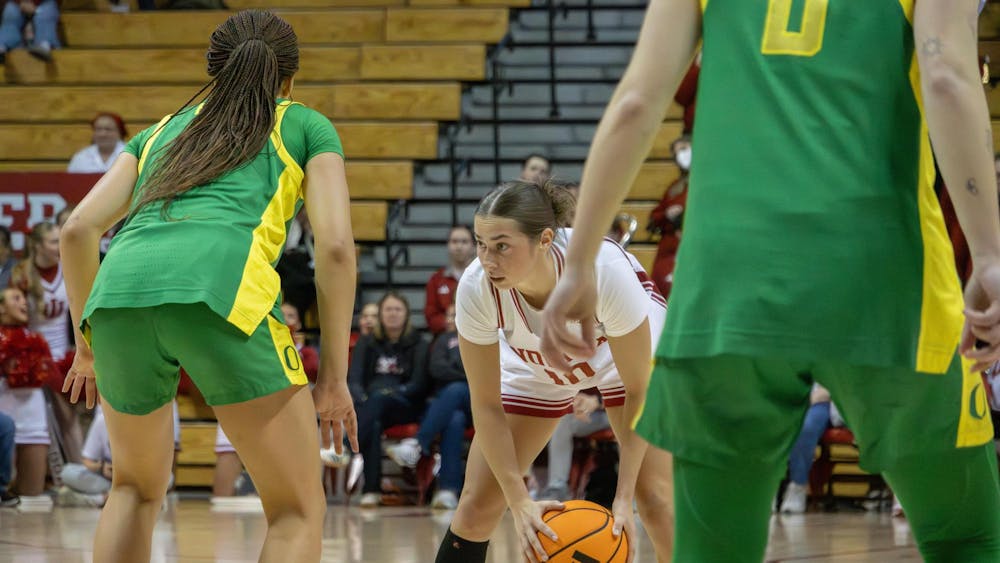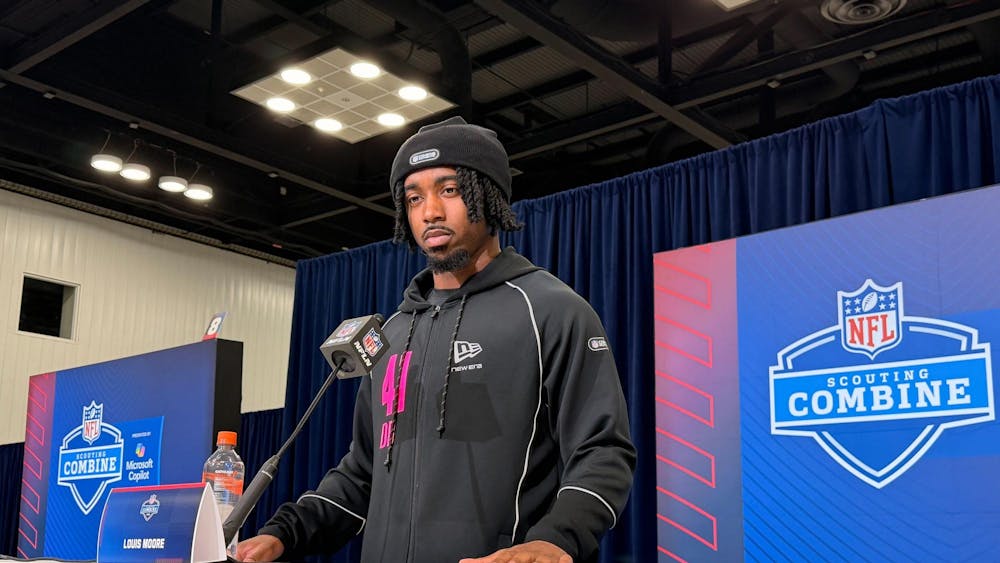Jordan Fuchs wanted to be on the field.
He wanted to line up alongside his fellow Hoosiers, now former teammates, last Thursday in Bloomington as they played the Ohio State Buckeyes. But instead of making plays on ESPN, he watched Ohio State beat IU from his apartment in Richmond, Indiana, minutes away from where he takes classes at IU-East.
Fuchs had to watch the game that featured Kevin Wilson’s return to Memorial Stadium and IU Coach Tom Allen’s home opener, just like he watched while injured as a junior at IU in 2016. The pain that came with not being able to play the game he loved rushed back, along with the hurt that accompanied IU’s 2015 home loss to Ohio State.
All he could think about was getting back on that field.
“You work up to this short window that you’ve got, and maybe early in my career I took it for granted, but now I know,” Fuchs said. “You see that window closing.”
Last Thursday’s game ended around midnight, and almost immediately, Fuchs was in his apartment complex’s gym lifting dumbbells, working out. He had to do something.
“I just want to show what I can do,” Fuchs said.
...
Fuchs’ time with the program wasn’t supposed to end on March 25, 2017 with a dismissal. He wasn’t supposed to attend IU-East this fall, often training on his own while seeking to regain his academic eligibility.
He was supposed to assume the role Ted Bolser left vacant. Bolser, who graduated in 2013, was one of the most productive tight ends during Wilson’s tenure as head coach. Instead, Fuchs dislocated his left ankle and broke his fibula during IU’s 2016 season opener at Florida International.
Fuchs said coaches and trainers started to treat him differently after he got hurt. They pressured him to speed up his recovery, especially then-tight ends coach James Patton. Fuchs said Patton, who now coaches at the University of Pittsburgh, berated him for not gaining enough weight even though Fuchs struggled to do so throughout his time at IU due to issues beyond his control. Patton was not available for comment.
The culture isolated Fuchs and other injured Hoosiers from their teammates.
This was about a year and a half after IU felt the need to bring in an independent law firm to investigate concerns of player mistreatment. According to a memo IU Athletics Director Fred Glass sent Wilson on May 13, 2015, Taft Stettinius & Hollister LLP recommended steps to rectify “behaviors that may create an unhealthy environment for injured players."
Taft’s spring 2015 report found some players had either witnessed coaches pressuring others or felt pressure themselves to push through injuries. Any actions that demeaned injured players, Glass said at the time, “are completely unacceptable and will not be tolerated.”
When Glass realized he had to revisit those issues during fall 2016, “philosophical differences” between himself and Wilson led to Wilson’s resignation Dec. 1, 2016.
Over the course of the fall 2016 semester, Fuchs mentally withdrew from school, and his grades dropped even lower than they had when he was battling concussions as a sophomore. By November, the pressure from coaches to return drove him to Bloomington’s College Mall, where he said he purchased an anabolic steroid called Dianabol at a nutrition store.
About a week after he started taking it, Fuchs was assigned a random drug test. He said he doesn’t know if he would have kept taking Dianabol if he hadn’t been tested because he didn’t take it long enough to see any benefits.
“I was just trying to get back on the field faster,” Fuchs said.
The test results came back quickly. Fuchs failed. In accordance with NCAA rules, Fuchs wouldn’t be able to play in games for a year.
A meeting with Allen, who had recently moved from defensive coordinator to head coach, and Patton after a position meeting in December 2016 reaffirmed that. He did not travel with the team to California for the Foster Farms Bowl.
Fuchs, who chose to appeal the NCAA suspension, said he went home with no indication of a team-specific suspension and conflicting statements from Mike Pechac, the director of player development and academic enhancement, and Allen, who he never saw or talked to again after that December meeting.
Fuchs said Allen told him IU had the option to let him go, but that ultimately the decision was up to the school. Twenty minutes later, Pechac pulled him to the side and told Fuchs it was up to Allen.
“At that point, I didn’t know what to think or believe,” Fuchs said. “I didn’t know what was really going on.”
Fuchs reported back to the team after winter break but couldn’t find his locker. He says his stuff had been collected and placed in a bag for him. Pechac told him he had been suspended indefinitely.
It wasn’t until March 21, a few weeks after Allen publicly announced Fuchs' indefinite suspension March 2, that Fuchs had his conference call with the NCAA to appeal the yearlong suspension it had handed down. Three days later, Fuchs learned the NCAA decided to cut the suspension in half as he said he had requested. He had taken the banned substance, yes, but the environment he was in played a part in his decision.
It’s unlikely his grades would have allowed him to be eligible this fall, but there was a chance he could rejoin his teammates on the field in 2017.
Instead, on March 25, Fuchs’ dad sent him an Indiana Daily Student article that listed three IU football players who had been dismissed from the program. The story’s main image featured Fuchs. He was one of the three.
Thinking back, Fuchs remembers when IU coaches would send emails about players around the country who got in trouble as a way to warn them to stay in line.
“It is kind of crazy,” Fuchs said. “Somebody probably got an email about my dismissal."
...
Now, almost six months since his career as a Hoosier ended, Fuchs still isn’t sure why he was dismissed. Allen never publicly specified why the decision was made, and when asked by the IDS to elaborate, an IU Athletics spokesperson, Jeff Keag, said, “Coach Allen addressed this during spring practice, and the program will have no additional comment.”
Fuchs said Pechac, who was not made available for comment, told him at the time that it was nothing personal, just business. But regardless of the reason, Fuchs’ focus has switched to correcting his mistakes and working to get back on the field.
His dad, Michael Fuchs, said it took time for his son to get past the shock of what had happened and realize he wasn’t a total victim.
“I think it’s the best thing that ever happened to him,” Michael said. “Sometimes, a kid needs to fall down to get back up."
Michael doesn’t blame IU for dismissing his son. He’s also in the dark as to the official reason, but he said he thinks Fuchs more so gave up his scholarship than had it taken away.
This past summer, he saw Fuchs finally start to come around to that reality.
Fuchs could have been at Illinois State right now. He visited the program this past spring and said the medical staff told him his ankle was fine. But his grades prevented him from doing so, and after taking a couple summer classes in Bloomington, he switched to IU-East so that after the fall semester, he would be academically eligible to use his last year of eligibility to play anywhere.
“I’ve just got to do the work,” Fuchs said. “I’ve found my little path.”
That work includes training however he can. It started back in Bloomington with former teammate Dominique Booth. The two came to IU as a part of Wilson’s 2014 recruiting class and played together before injuries kept Booth off the field his sophomore year and eventually led him to take a medical hardship waiver.
Booth remained with IU football as a student assistant coach in 2016, and he was on the field in Florida last fall when Fuchs suffered his season-ending injury.
“I think that was probably one of the most disgusting things anybody on our team had probably seen at that time,” Booth, who now works as a trainer in Bloomington and Indianapolis, said. “I just remember all of the coaches were like, 'Turn away. Don’t look at it.'"
By the time Fuchs started training with Booth in Bloomington, Fuchs was no longer with the program and had just gotten comfortable testing his ankle. The pair focused on agility, balance and speed drills in addition to lifting weights to get Fuchs’ leg strength back.
They weren’t able to see each other much over the summer, but Booth sent Fuchs workouts to do, and they plan on training at Booth’s Indianapolis location this fall.
Booth said he just wants Fuchs to believe in himself. That’s really his only goal for him because he said that wherever Fuchs goes, he can succeed if he has confidence in himself.
Knowing that made watching Fuchs get hurt at FIU that much worse. Fuchs appeared to have it all figured out.
“Jordan, that year, was expected to have a 1,000-yard season,” Booth said. “I was a coach. I was there."
This November, Fuchs plans to find a landing spot where he'll be able to hit the ground running in the spring.
“Even though things happened at IU, with me being who I am, I want to finish what I started,” Fuchs said. “I started at Indiana, and I want to finish there. I’d probably be more comfortable doing that rather than going somewhere else.”
Booth thinks Fuchs’ desire to return to IU is a bit odd. Fuchs’ versatility as an athlete should provide numerous other options. But Booth also knows other players who thought about leaving when Wilson was head coach and changed their tune when Glass hired Allen.
It’s a different environment, a different place. Fuchs sees that, as does Booth, but that doesn’t mean IU will take him back.
“Up to this day, they’ve found every reason to not have him there,” Booth said.
Michael said he hopes everything that’s happened can be put in perspective.
“He didn’t beat up anyone or run over anyone with his car,” Michael said. “There’s nothing that he did that would not warrant him coming back, unless they don’t want him. Then that’s OK, too. That’s why there are so many other schools out there.”
But even as Fuchs entertains the thought of finishing his collegiate career as something other than a Hoosier, every day he looks at the same IU poster of himself when he leaves his room.
“I really need to do some things in that jersey that I didn’t get to do,” Fuchs said.






